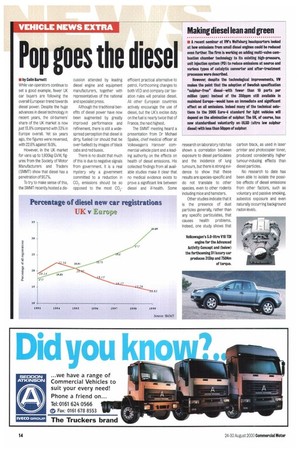Pop goes the diesel
Page 16

If you've noticed an error in this article please click here to report it so we can fix it.
IN by Colin Barnett
While van operators continue to set a good example, fewer UK car buyers are following the overall European trend towards diesel power. Despite the huge advances in diesel technology in recent years, the oil-burners' share of the UK market is now just 13.8% compared with 33% in Europe overall. Yet six years ago, the figures were reversed, with 22.6% against 19.5%.
However, in the UK market for vans up to 1,800kg GVW, figures from the Society of Motor Manufacturers and Traders (SMMT) show that diesel has a penetration of 90.7%.
To try to make sense of this, the SMMT recently hosted a dis
cussion attended by leading diesel engine and equipment manufacturers, together with representatives of the national and specialist press.
Although the traditional benefits of diesel power have now been augmented by greatly improved performance and refinement, there is still a widespread perception that diesel is dirty, fuelled (or should that be over-fuelled) by images of black cabs and red buses.
There is no doubt that much of this is due to negative signals from government. It is a real mystery why a government committed to a reduction in CO2 emissions should be so opposed to the most CO2
efficient practical alternative to petrol. Forthcoming changes to both VFD and company car taxation rules will penalise diesel. All other European countries actively encourage the use of diesel, but the UK's excise duty on the fuel is nearly twice that of France, the next highest.
The SMMT meeting heard a presentation from Dr Michael Spallek, chief medical officer at Volkswagen's Hanover commercial vehicle plant and a leading authority on the effects on health of diesel emissions. His collected findings from all available studies make it dear that no medical evidence exists to prove a significant link between diesel and ill-health. Some research on laboratory rats has shown a correlation between exposure to diesel particulates and the incidence of lung tumours, but there is strong evidence to show that these results are species-specific and do not translate to other species, even to other rodents including mice and hamsters.
Other studies indicate that it is the presence of dust particles generally, rather than any specific particulates, that causes health problems. Indeed, one study shows that carbon black, as used in laser printer and photocopier toner, produced considerably higher tumour-inducing effects than diesel particles.
No research to date has been able to isolate the possible effects of diesel emissions from other factors, such as voluntary and passive smoking, asbestos exposure and even naturally occurring background radon levels.








































































































